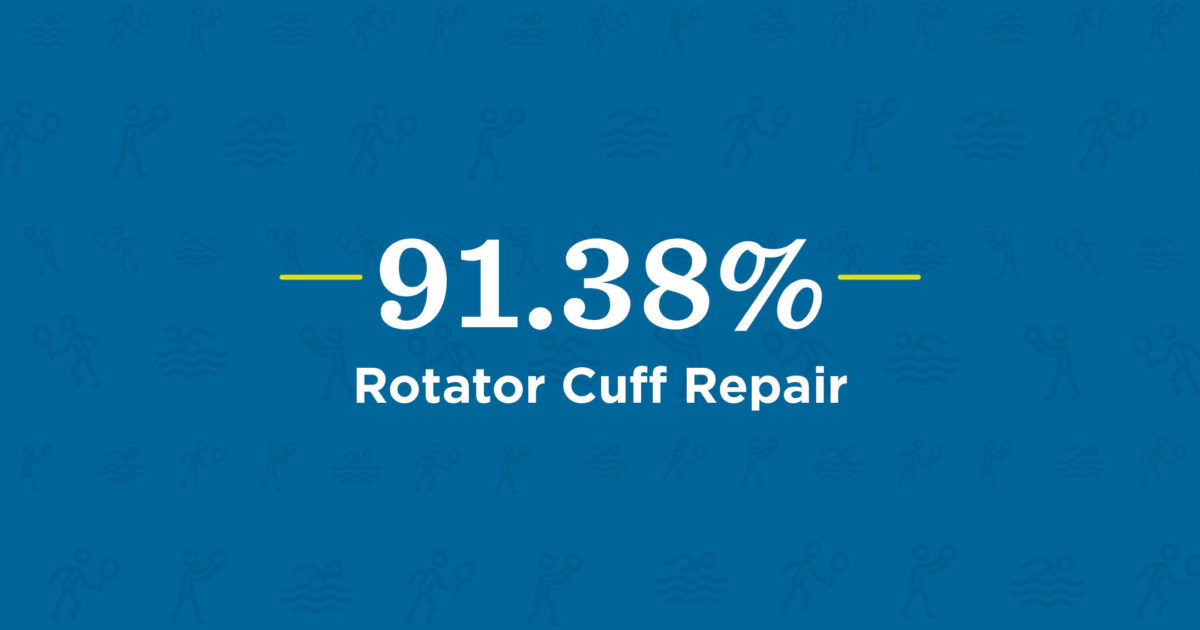
January 7, 2020 - TCO
Quality & Outcomes: Rotator Cuff Repair
At Twin Cities Orthopedics, we have a responsibility to our patients, their families, and our communities as a whole, to make health care better for everyone. That’s why for the past several years we’ve been analyzing surgical outcomes, gathering feedback about your experiences, and putting the data to good use.
About Our Data
After every experience with TCO, we kindly ask our patients to provide feedback. We ask about their overall experience, and whether or not they would recommend us to family and friends. We ask them to tell us about their pain and mobility before and after surgery, so we can monitor their progress and customize their care experience.
Thanks to the generosity of patients who filled out forms after their visits, we’ve collected nearly half a million patient surveys. That’s an incredible amount of information, and we’re grateful for every patient who has contributed.
We’re using this data to make improvements across our practice and elevate the experience for everyone at TCO.
Why Data Matters
Healthcare is evolving, and people deserve to be in the driver’s seat of their own care. At TCO, we’re developing tools so patients can make more educated decisions about their health. By publishing data about surgical outcomes and patient satisfaction, we hope prospective patients will feel empowered to:
- Ask their physicians about surgical outcomes, and feel more prepared
- Ask their providers about how much procedures cost, and feel more in control
- Ask their families and friends about who they would recommend, and feel more confident
- Ask their employers how they make healthcare decisions, and feel more involved
- Ask tough questions, and hold our industry accountable
Change doesn’t happen overnight, and we’ll never stop trying to earn people’s trust, but 98% of our patients would recommend TCO to family and friends, which tells us we’re on the right track.
Learn More: Rotator Cuff Repair
If you have pain that runs down the side of your arm that is worse when reaching out or lifting away from your body, it’s likely associated with the rotator cuff. If the pain does not subside in a few days, it’s best to be evaluated by a shoulder specialist.
“If the tendon is torn, it’s important to get it repaired in the first two to three months after injury. Old rotator cuff tears cannot be fixed.” – Dr. Jason Dieterle
Patient-reported outcome data for rotator cuff repair tells us that 1 year after surgery, 91.38% of TCO patients report little to no difficulty with daily activities. In other words, you can be very confident your range of motion will improve and your pain will decrease if you choose to have this procedure.
About the Procedure
- Rotator cuff repair is a very common surgery.
- The point of the surgery is to reattach the tendon so that it heals back to the bone. The repair consists of placing an anchor in your bone.
- This is usually a same-day surgery and does not typically require overnight hospitalizations.
- The procedure can be done through an open incision, or with shoulder arthroscopy, which is minimally invasive.
- The hope and expectation is full functionality of the shoulder and no limitations on the use of the shoulder long-term.
- 38% of TCO patients report little to no difficulty with daily activities.
What to Expect
- After the procedure, patients will be required to wear a sling for a period of time; generally 4-6 weeks.
- Typically, a return to full activities takes 6-12 months.
- You cannot speed up the recovery process by doing more physical therapy or lifting more weights.
- Be prepared to change your activities and not overdo it after this procedure.
- Physical therapy starts with regaining the motion in your shoulder. This takes 6-8 weeks after surgery.
- You will gradually start to gain strength in your shoulder and rotator cuff. It can take up to 6-8 months to regain full strength.
- Patience is key. This is a long, slow recovery. Some people have a lot of pain, some do not. Some people need a lot of therapy, others don’t.
Special thanks to Dr. Dieterle for his insights into the procedure.
If you or a loved one is considering a rotator cuff repair, or would like to speak to a TCO shoulder specialist, we’re here to help.
- Find a Location: schedule an appointment at a convenient location near you.
- Find a Physician: contact our team of experts.

